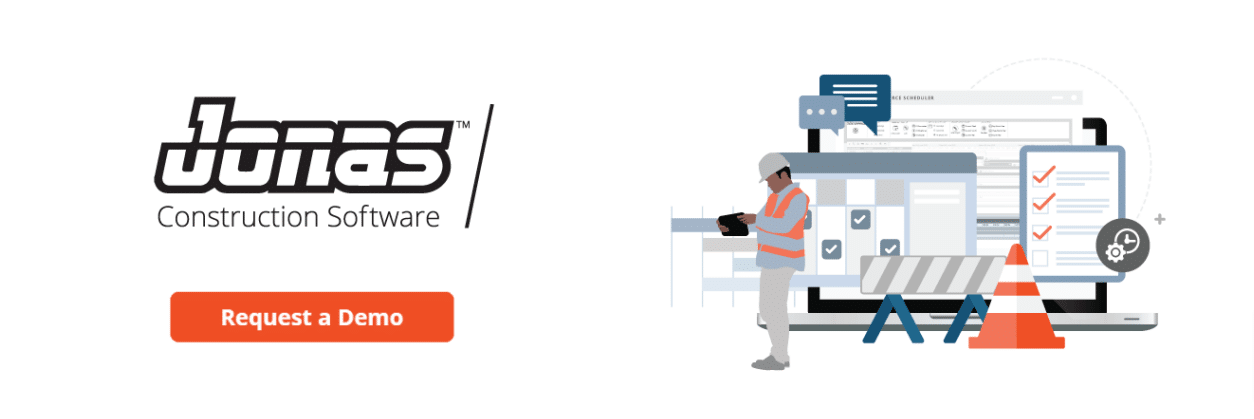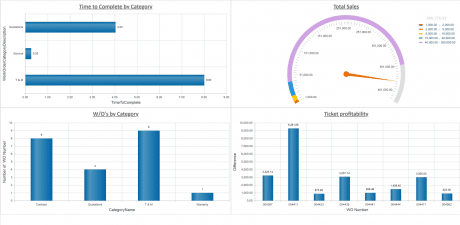Last Updated on July 4, 2024

The best construction accounting software is the one that is designed specifically for its intended user. Whether your goal is to grow your business, be more efficient, or satisfy more customers, it’s important to consider how your accounting software fits (or doesn’t fit) with your construction or service business.
Construction accounting software can play an important role in the success of your business. While all-purpose accounting software can have value, your business may get to a point where it simply can’t keep up. If you want to make the most out of your accounting software, it’s worthwhile considering whether your accounting software is the BEST or WORST!
So, how do you break free from standalone, non-construction-centric software? In this article, we are going to help you identify some of the warning signs that your current system may be stifling your progress. You will also discover how to choose the best-of-breed construction accounting system that gives you the best bang for your buck.
The Worst Construction Accounting Software

Every business owner hopes that their business will expand and improve steadily and predictably. As your construction organization grows, you may notice that the software that once met your needs is no longer keeping pace with your improved business processes.
This mismatch often becomes most visible in accounting when business growth makes your software outdated. The explanation for why this happens originates in how non-construction-centric software handles your financials. Let’s dig into some of the red flags so you can see what we mean.
Construction Accounting Software Red Flags
The wrong accounting software can cost you revenue, productivity, customers, and more. Does outdated accounting software hinder your business processes? Look out for these red flags to save yourself in the long run.
No Integration
Are you manually entering data into your accounting software? Do your employees spend hours copying and pasting information from order management into a standalone accounting system?
If you have standalone accounting software, you will need to take all the information from the ordering system and manually enter it into your accounting software.. It not only increases the chances of human error, but there can be delays in data entry, making it challenging to have the most up-to-date information available at all times. This can limit business growth and requires extra resources to re-enter the data.
When the business information is siloed, it can negatively impact the accuracy of your financials and your decision-making. For example, when a company uses multiple, isolated tools for finance, invoicing, and resource allocation, the discrepancies in information can result in decreased revenue, inefficient resource usage, and inaccurate data.
Part of managing a successful construction or service business has to do with the decisions you make. If you’re questioning your financial information, then making better, more informed decisions becomes an uphill battle.
No Room for Growth
Is your current software supporting your growth? Another red flag that your current software is no longer working for you could be your access to information or the lack of access to information. You’ll know your business is outgrowing your current software when you need to report on multiple projects or companies, and you’re not getting the information you need fast enough to make smart decisions.
This happens because entry-level accounting programs have limitations on the database size, and your business growth may be restricted by these limitations. And when you reach the maximum capacity of your accounting software, the system may lose performance. System lock-ups and sluggish performance make it difficult to access your financial data. While you can turn to costly and time-consuming custom programming, this only provides a temporary delay for a more scalable solution.
Difficult or Time-Consuming to Use
Your software program should be straightforward and fairly painless to use. If you find yourself unable to find the information you need easily and quickly, or you and your team are banging the keyboard in frustration when adding data, it may be time for a new software system.
Learning a software program isn’t always necessarily easy, but using it should be fairly simple and uncomplicated. A software program that meets the demands of your business will not only foster greater communication between departments, make it easy to access the data you need from anywhere, and improve efficiencies, it also needs to be a program that everyone on the team can use without getting frustrated.
Not Suitable for Construction Businesses
To get the job done right, you need the right tools. Then why use generic accounting software for managing the unique accounting needs of a construction business? Construction accounting requires horsepower to handle and synchronize hundreds of transactions, often across multiple entities. In addition to general business accounting, you might want to track job costs, overhead, retainage/holdback, and more.
Most businesses operate as one big profit center, but in construction, a job becomes a separate profit center. Each project has its own costs, revenue, and payroll. A solid G/L, cash flow analysis, and reports broken out by job are required to tell how a single job is performing.
Things can quickly become overwhelming for construction professionals without the right tools. You may be frustrated when your accounting software experiences processing issues due to the large number of jobs, divisions, contractors, and subcontractors. Remember, the best construction accounting software is built for the intended user. On the flipside, accounting software that isn’t built to connect the different areas of your business, such as integrating accounting with your jobs, may not end up being suitable.
So, did you notice any red flags that pop up in your accounting processes? If your accounting software supports no integration, has no room for growth, is difficult or time-consuming to use, it might be time to think about a change. You might be ready for a construction-specific accounting platform that will meet all your needs and expectations.
The Best Construction Accounting Software

The best construction accounting software is purpose-built to meet the unique needs of the industry. Fully integrated into payroll and job costing, it helps contractors to track financial data for each project they manage.
Similar to general accounting systems, construction-specific software has a general ledger (G/L) at the core, with integrated accounting modules that meet construction-specific needs, from drillable reports to specialized billing. The job costing is a fully integrated function and the majority of day-to-day transactions are done through your accounts receivable (A/R), accounts payable (A/P), and payroll.
Features of The Best Construction Accounting Software
Every football team needs a quarterback, linemen, running backs, and receivers. The same is true when you think about a good accounting system: You need a general ledger, accounts payable and accounts receivable modules, payroll and reporting. These basic functions are vital. But there’s a big difference between how these functions operate in a robust construction accounting software package versus a generic, entry-level software.
Let’s take a look at the functionality that the best construction accounting software should offer.
Full Integration with Other Construction Software Features
An integrated construction accounting system can change the way your business works, in terms of both growth and profitability. Integration brings together different modules so that they are working seamlessly without the need for costly, time-consuming manual customization or additional software tools.
For example, the integration of accounts receivables and accounts payables ensures better visibility of transactions. As a result, critical records like invoices, work orders, estimates, and related documents can be easily viewed in one place. This helps to identify overdue payments or review the payment history for a particular vendor.
With a fully-integrated construction accounting software, no additional entry is required in a separate job journal. When a new transaction is entered into the relevant G/L accounts, job costing reports are updated at the same time. While some standalone accounting systems have a job costing add-on module, fully integrated systems ensure that job costing and the G/L precisely reconcile.
Fully integrated job cost accounting provides your project with a complete cash flow analysis. Aging reports are tied to the G/L which keeps you on top of slow-paying clients.
Integration means all your records and data become more reliable. Duplicate data is no longer a problem to be concerned with, and time-consuming data entry is reduced.
Templates for Easy Financial Reporting
Financial reports are essential for running a construction business smoothly. When creating a financial report for your construction company, the contents of the report should be easily understandable. A template encourages repeatability, efficiency, as well as flexibility so that created objects inherit the cost codes, cost types, and mappings from the job template.
With the best construction accounting software, you can create multiple templates tailored to customers, subcontractors, and more. You should be able to include signature fields, initials, custom fields, clauses, and other data types that are relevant to your business.
Inter-Company Accounting Features to Support Business Growth
As your construction business grows, you may want to track financials and create reports separately for other companies within your organization. Internal transactions are common in the construction industry, but they don’t always go smoothly.
Inter-company accounting (sometimes known as reconciliation), has a reputation for being a burden on accounting departments but is a crucial process for any construction or service company that has at least one subsidiary.
The best construction accounting software should allow you to easily manage the financials of multiple companies and divisions with automatic inter-company accounting. What you’ll likely need is the ability to set up an unlimited number of companies and let the system do the rest. This way, you automate the core accounting transactions and loan accounts, eliminating manual data entry and the chance of errors.
Let’s take a look at other useful features that enable efficient inter-company accounting. The best construction accounting software will allow you to:
- Manage and close financial periods separately for each company.
- Activate and deactivate financial periods for posting for a particular company, and close books separately in each company.
- Navigate between companies and branches that represent separate legal entities.
- Perform centralized cash management, vendor payments, and customer invoicing.
- Generate customized reports across one, selected, or all companies with integrated reporting tools.
- Use financial reporting tools that can eliminate inter-company transactions on company-wide reports.
This way, your accounts stay in balance, and your consolidated reports accurately reflect company-wide results.
Inter-company reconciliation is vital, as it prevents reporting inaccurate information on income statements, and avoids misrepresentation of a construction or service company’s financial position. As a result, you can concentrate on your construction business, while always having an overview of all business areas and branches and always have all the data and facts at hand for well-informed decisions.
How to Avoid Wasting Money on Accounting Software
If your construction accounting system doesn’t allow integration, requires custom coding or manual data entry, is difficult or time-consuming to use there’s a strong chance it’s a continued waste of money for your business. Here are the warning signs:
- You are drowning in manual processes to manage your accounts or complete key tasks.
- Expenses are managed by tallying up faded paper receipts.
- You are inundated with repetitive, time-consuming tasks that make you stressed because human error is a common problem with serious consequences.
- The accounting software integrated with the older version of your applications, but they do not work well together.
- You may even miss tax deadlines because of outdated accounting software – and this brings financial penalties upon you.
- You manage finances in multiple locations because your standalone tools cannot integrate.
- Your reports lack important details.
- You need specialists to continually repair your legacy system.
- Your highly-skilled staff members are wasting time on mundane chores just to get things done.
- You focus more on bookkeeping and less on running your construction business because of a lack of automation.
Think how much time and money you are wasting on an outdated and inefficient accounting system. A clear-cut view of finances helps you make informed decisions when it comes to construction budgeting. According to the latest global construction industry statistics, 90% of global infrastructure projects are either over-budget or delayed. With a construction accounting software that manages your jobs and service, you can use work-in-progress reporting to stay on-time and under-budget.
When you notice that your accounting software raises any of the red flags mentioned above it may be time to evaluate whether your current software is right for your business.
Jonas Construction Software is the Best Construction Accounting Software
So, what does it take to be the best construction accounting software?
Well, your accounting software is the financial foundation of your construction business. With industry-specific construction accounting at its core, every module in Jonas construction management software is fully-integrated. As an enterprise resource planning (ERP) software rather than merely an accounting software like Quickbooks, Jonas saves you time and ensures accounting transparency and integrity by eliminating error-prone double entry.
Jonas ERP software also grows with your business. It fully integrates your job costing, service management, and accounting so that as you reach and exceed your goals, your software supports you. Fully integrated modules make the accounting processes automated, efficient, and transparent.
The Jonas software suite also provides you with:
- Accurate reporting and tracking capabilities, all in real-time.
- A quick and easy-to-use approval process, so your business can enhance productivity and streamline accounting operations.
- Full integration, so you can manage the financials for all areas of the business.
- Document management to keep your documents organized and up-to-date.
- The ability to drill down into the financial details to help you quickly analyze and uncover any irregularities.
- A mobile app for invoice, quote, and receipt capture via a mobile device outside the office.
Finally, Jonas is specifically designed to meet the unique needs of general contractors, specialty contractors, and contractors in the plumbing, HVAC, electrical, and mechanical fields.
Do you want to explore what a fully-integrated construction accounting software can do for your construction business? Learn more about how Jonas Construction Accounting Software can keep your construction business going and growing.






